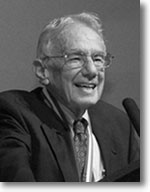
Image Credit: California Energy Commission
Now 83 years old, Arthur Rosenfeld probably understands as well as anyone on the planet the consequences and opportunities inherent in our approach to energy use and conservation.
Perhaps the best thing about Rosenfeld’s analyses of the costs, benefits, and potential drawbacks to increasing energy efficiency is that most of them yielded recommendations that were relatively easy to follow and produced remarkable results. Turn off the lights when you leave the room. Shut down appliances when you’re not using them. Build energy efficient buildings and cover their exteriors (especially roofs) with light-colored material. Design appliances to operate more efficiently.
In California, where Rosenfeld served on the California Energy Commission, the state’s principal energy planning and policy agency, energy conservation mandates have helped keep per-capita energy consumption flat for the past 30 years. The implementation of these mandates was, of course, incremental and often slowed by businesses and citizens interested in maintaining the status quo, but ultimately the state found itself using less electricity and petroleum-based fuel – and saving on energy costs – by applying remedies that required fairly straightforward changes in behavior or design philosophy. That, as Rosenfeld emphasized time and again during his long tenure with the commission, is cheaper and more ecologically beneficial than building more power plants.
Battling profligacy
Rosenfeld, who recently retired from the commission, comes from an academic background that emphasizes the theoretical as much as the practical. As a recent Los Angeles Times profile points out, he studied particle physics (under Enrico Fermi) at the University of Chicago for his doctorate, but discovered his true calling in the early 1970s during the Arab oil embargo, when he realized the most expedient way to prevent or offset similar crises was to push policies that would reduce energy waste and increase energy efficiency.
Rosenfeld and his colleagues backed up their recommendations with solid research – more than enough to help generate many of the initiatives that have made California a global leader in energy conservation and in energy efficient construction. Fortunately, too, Rosenfeld is adept at deploying a couple secret weapons when facing skeptics: his knack for self-effacement and elegant explanations that, as the Times notes, make “science understandable to people who couldn’t screw in a light bulb.”
If you haven’t already seen the profile, consider checking it out. It’s a fitting tribute to a man who has done a lot to lead us down the green path.
Weekly Newsletter
Get building science and energy efficiency advice, plus special offers, in your inbox.














0 Comments
Log in or create an account to post a comment.
Sign up Log in